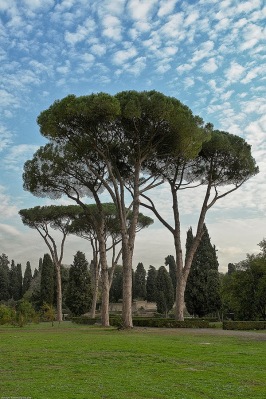“Sometime
too hot the eye of heaven shines,
And often is his gold complexion dimm’d”
WS
And often is his gold complexion dimm’d”
WS
~~~~~~~~~~
[From a previously unknown dialogue of Plato]
Socrates: Imagine, Glaucon, a great field.
It sits in a landscape like ours; there are mountains around it, rivers, other plains and woods. In this new world there is every sort of animal and bird with which we are familiar as well as everything else in which we take pleasure. The sun, moon, and stars are just as they are in our own world. Nor must we neglect to provide every plant and tree. In short, there is everything there to make men and women happy.
But now see!
In the midst of this landscape there is a grassy field and there, beneath a canopy, people sit chained to benches and with their heads in fixed positions gazing out on this world. They have been this way all their lives.
Glaucon:
A strange sight, Socrates! And these are strange prisoners.
S. : They are like ourselves.
 |
| Grounds of the Baths of Caracalla, Rome, Italy. Courtesy of SquinchPix.com |
Now
further imagine that in front of them there are other people, ordinary town and
country dwellers who are as free as we are ourselves. And they live out their
daily lives in front of the prisoners. They earn money through trade or farming
or crafts. They celebrate the feast days with processions and sacrifices. Every
season of the year brings to these townspeople and farmers the required tasks
and these, too, are played out before our prisoners. Nothing is hidden from our
prisoners, not even their loves or hates, because the townspeople live for the
prisoners alone. If the prisoners had lived their lives in this fashion,
chained and yet perfectly free to see everything around them, would they not
have gained an intimate and detailed knowledge of the lives of the
town-dwellers which are lived, as it were, in their faces? Would they not think
of what they have seen as comprising the whole of reality?
G. :
Indeed they would, Socrates, but I don’t understand. Do you mean to say that
they are chained up all the time?
S. : They are indeed, Glaucon. But I am about to release one. So imagine further that one of them, unseen by the guards, manages to loosen his shackles and slips away from his imprisonment undetected. He now wanders down the road and sees other towns, other rivers, other peoples. He has no trade or any knowledge of how to earn his daily bread since he has only seen such things but never performed them. He has only the thin clothing he has escaped in and is subject to the inclemency of the weather. The sun which had seemed such a friendly star to him through his whole previous life is now found to be too hot on occasion. And when it rains or snows he has no shelter but must cower under the nearest tree. For the first time in his life he is subject to every unhappy circumstance which our daily life affords. The moon, previously thought of as merely the lovely orb of the night, now announces only a bitter cold and a frightening darkness.
G. : A predicament indeed, Socrates!
S. : Certainly. And then, one day, while cowering in the hedges from some too-inquisitive wild dogs, he discovers a hole in the earth. It is wide and lofty enough for him to wander into without even bowing his head. He resolves to explore this cave and see whether he can turn it to his benefit. Immediately he is happier because he is out of the glare of the pitiless sun. The cold winds which had chilled him to the bone are now stilled. The marauding bears and wolves are here absent.
But then, as I allow no free men in my cave, he is set upon by men unknown and overpowered. Rendered unconscious, he awakes to find himself deep underground and once more chained to a bench before a kind of stage on which shadow plays are performed.
G. : But what sort of plays, Socrates?
S. : You shall see, Glaucon.


No comments:
Post a Comment